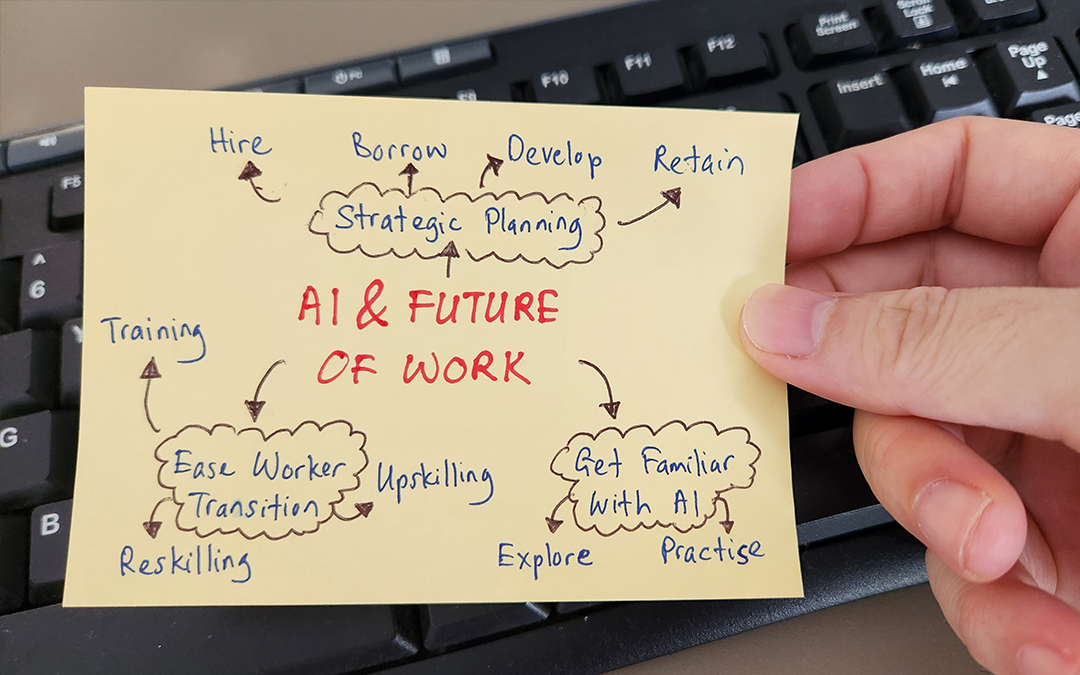While no one knows exactly what the future of workforce management holds, here are six trends with staying power for 2024.
In the ever-evolving landscape of workforce management, business and HR leaders must stay ahead of the curve to ensure the success and resilience of their organizations. While no one knows exactly what the future holds, we are tracking emerging and persistent trends that are shaping the year ahead. If you’re thinking about the future of workforce management, here are six trends with staying power for 2024.
Generative Artificial Intelligence is On the Rise
Artificial intelligence (AI) has been in the works for decades, but the recent and rapid integration of generative AI is becoming a transformative force in workforce management. This sophisticated technology goes beyond traditional AI, enabling machines to generate content, understand context, and even exhibit problem-solving capabilities. HR leaders are increasingly leveraging generative AI to streamline recruitment processes, enhance employee training, and optimize decision-making.
Now is the time for organizations to harness the power of generative AI. And, in 2024, it is crucial for leaders to invest in both AI literacy and ethical considerations to ensure responsible and effective implementation.
Remote Work is Here to Stay
The global shift to mass remote work, initiated during the pandemic, has become a permanent fixture in the workforce landscape. Organizations that strike the right balance between remote and in-person work will be poised to attract top talent, improve employee satisfaction, and achieve greater flexibility in their operations.
As the hybrid work model becomes the norm, business leaders will need effective technology and cultural practices that support collaboration, communication, and employee well-being. A focus on results-driven performance metrics will be essential in managing remote teams effectively.
Generation Z is an Emerging Force
Generation Z (Gen Z) is quickly making its mark in the working world, bringing new values, expectations, and working styles. Now ranging in age from 12 to 26 years, this group was born into a digital age and entered the workforce when remote work was becoming a norm. Gen Z yearns for purpose, diversity, and authenticity in the workplace. They also expect their employers to be good corporate citizens.
Engaging Gen Z may prompt innovations that will foster important changes for the future of workforce management. Company and HR leaders should listen, learn, and adapt their workplace policies to resonate with this emerging generation, emphasizing social responsibility and a strong company culture.
Increased Automation Sparks Upskilling Initiatives
The accelerating pace of automation in technology, manufacturing, and many other industries is reshaping job roles, demanding a higher level of technical skills across sectors. Upskilling and reskilling initiatives are increasingly important to equip the workforce with the necessary skills and competencies for the new world of work.
Proactive upskilling enhances employee value and positions companies to be leaders in innovation. Investing in continuous learning programs, mentorship opportunities, and partnerships with educational institutions are key strategies for staying competitive in an increasingly automated marketplace.
Career Path Trajectories Are Evolving
Traditional linear career paths are giving way to more dynamic models. Today’s employees seek diverse experiences, skill development, and opportunities for personal growth – but not necessarily a career ladder. Many in the younger generations choose work flexibility over traditional promotions and management responsibilities that often come with longer hours and more stress.
Flexible career paths, where employees can change their career focus in response to personal and professional priorities, can be appealing to workers and employers alike. Mentorship programs and cross-functional mobility provide employees with direction, support, and growth opportunities. Employers with flexible career pathing are more likely to fill open positions with current employees, while fostering a culture of continuous learning and high employee engagement.
Employee Experience is Top of Mind
As low unemployment rates persist and the competition for skilled workers continues, prioritizing the employee experience has become a strategic imperative. Beyond traditional benefits, companies must focus on creating a positive work environment that fosters well-being, inclusivity, and a sense of belonging.
Recognizing and celebrating achievements, both big and small, contributes to a motivated and engaged workforce. Managers who listen, care, and connect with individuals and the team – in person and remotely – can help build engaging relationships that matter. Employee feedback, regular surveys, and open communication channels can help HR leaders to gauge and enhance the overall employee experience – ultimately driving organizational success.
2024 promises to be a pivotal one for businesses. By proactively addressing today’s trends shaping the future of workforce management, organizations can position themselves for long-term success and sustainability.
If you’re looking to optimize your workforce, download our Competency Management Toolkit for tips on how to use skills and competencies to support the future of workforce management. Or contact us to see if Avilar’s WebMentor Skills™ competency management systems may support your team.
RELATED RESOURCES
How to Offer Flexible Career Pathing Using Competency Management
Generative AI: Friend or Foe in the Workplace?
Reskilling, Upskilling and New Skilling: When to Use Each
Talent Management Strategies to Build Your Future Workforce


